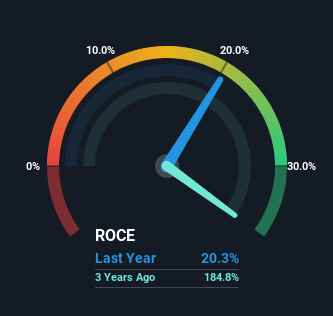- Hong Kong
- /
- Construction
- /
- SEHK:2195
Unity Enterprise Holdings (HKG:2195) Might Be Having Difficulty Using Its Capital Effectively
There are a few key trends to look for if we want to identify the next multi-bagger. Amongst other things, we'll want to see two things; firstly, a growing return on capital employed (ROCE) and secondly, an expansion in the company's amount of capital employed. If you see this, it typically means it's a company with a great business model and plenty of profitable reinvestment opportunities. So when we looked at Unity Enterprise Holdings (HKG:2195), they do have a high ROCE, but we weren't exactly elated from how returns are trending.
Understanding Return On Capital Employed (ROCE)
If you haven't worked with ROCE before, it measures the 'return' (pre-tax profit) a company generates from capital employed in its business. Analysts use this formula to calculate it for Unity Enterprise Holdings:
Return on Capital Employed = Earnings Before Interest and Tax (EBIT) ÷ (Total Assets - Current Liabilities)
0.20 = HK$33m ÷ (HK$278m - HK$116m) (Based on the trailing twelve months to December 2021).
Therefore, Unity Enterprise Holdings has an ROCE of 20%. In absolute terms that's a great return and it's even better than the Construction industry average of 7.1%.
Check out our latest analysis for Unity Enterprise Holdings

While the past is not representative of the future, it can be helpful to know how a company has performed historically, which is why we have this chart above. If you'd like to look at how Unity Enterprise Holdings has performed in the past in other metrics, you can view this free graph of past earnings, revenue and cash flow.
The Trend Of ROCE
On the surface, the trend of ROCE at Unity Enterprise Holdings doesn't inspire confidence. To be more specific, while the ROCE is still high, it's fallen from 59% where it was five years ago. Given the business is employing more capital while revenue has slipped, this is a bit concerning. This could mean that the business is losing its competitive advantage or market share, because while more money is being put into ventures, it's actually producing a lower return - "less bang for their buck" per se.
On a related note, Unity Enterprise Holdings has decreased its current liabilities to 42% of total assets. So we could link some of this to the decrease in ROCE. What's more, this can reduce some aspects of risk to the business because now the company's suppliers or short-term creditors are funding less of its operations. Since the business is basically funding more of its operations with it's own money, you could argue this has made the business less efficient at generating ROCE. Keep in mind 42% is still pretty high, so those risks are still somewhat prevalent.
In Conclusion...
From the above analysis, we find it rather worrisome that returns on capital and sales for Unity Enterprise Holdings have fallen, meanwhile the business is employing more capital than it was five years ago. Since the stock has skyrocketed 169% over the last year, it looks like investors have high expectations of the stock. Regardless, we don't feel too comfortable with the fundamentals so we'd be steering clear of this stock for now.
One final note, you should learn about the 3 warning signs we've spotted with Unity Enterprise Holdings (including 1 which is potentially serious) .
High returns are a key ingredient to strong performance, so check out our free list ofstocks earning high returns on equity with solid balance sheets.
New: AI Stock Screener & Alerts
Our new AI Stock Screener scans the market every day to uncover opportunities.
• Dividend Powerhouses (3%+ Yield)
• Undervalued Small Caps with Insider Buying
• High growth Tech and AI Companies
Or build your own from over 50 metrics.
Have feedback on this article? Concerned about the content? Get in touch with us directly. Alternatively, email editorial-team (at) simplywallst.com.
This article by Simply Wall St is general in nature. We provide commentary based on historical data and analyst forecasts only using an unbiased methodology and our articles are not intended to be financial advice. It does not constitute a recommendation to buy or sell any stock, and does not take account of your objectives, or your financial situation. We aim to bring you long-term focused analysis driven by fundamental data. Note that our analysis may not factor in the latest price-sensitive company announcements or qualitative material. Simply Wall St has no position in any stocks mentioned.
About SEHK:2195
Unity Enterprise Holdings
Unity Enterprise Holdings Limited, and investment holding company, operates as a contractor of repair, maintenance, alteration, and addition (RMAA) works in Hong Kong.
Slight risk with mediocre balance sheet.
Market Insights
Community Narratives




